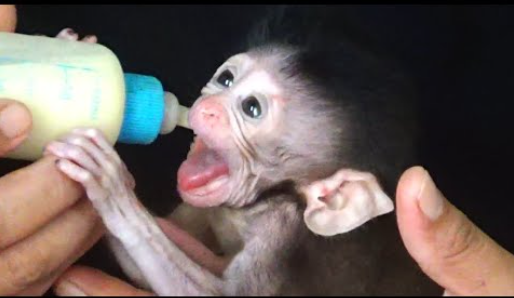Taking care of a newborn baby monkey at home is a challenging and significant responsibility, requiring specialized knowledge and resources. Here are some key considerations:
1. Legal Considerations
- Check Local Laws: Make sure it is legal to keep a monkey as a pet in your area. Many places have strict regulations regarding the ownership of primates.
2. Basic Needs
- Warmth: Newborn monkeys need to be kept warm. Use a heating pad wrapped in a towel or a special incubator set at the appropriate temperature (around 85-90°F or 29-32°C).
- Nutrition: Baby monkeys require a specific diet. Initially, they may need a milk formula specially designed for primates. Consult with a veterinarian to determine the best formula and feeding schedule.
- Feeding: Feed the monkey using a bottle with a nipple designed for small mammals. Ensure the formula is at the correct temperature and feed them every 2-3 hours, including at night.
3. Housing
- Safe Environment: Create a secure, clean, and warm environment. A large, escape-proof cage or enclosure with ample space to move and climb is essential.
- Enrichment: Provide toys and activities to stimulate the monkey’s natural curiosity and intelligence.

4. Health Care
- Veterinary Care: Regular check-ups with a veterinarian experienced in primates are crucial. Monkeys need vaccinations, parasite control, and health monitoring.
- Hygiene: Keep the monkey clean. Wipe them down with a damp cloth and ensure their living area is kept clean to prevent infections.
5. Social Needs
- Interaction: Monkeys are social animals and require a lot of attention and interaction. Spend plenty of time with the baby to ensure it feels secure and bonded.
- Companionship: If possible, consider having another monkey for companionship, as they thrive in social settings.
6. Long-Term Commitment
- Time: Monkeys require constant care and attention, which can be demanding and time-consuming.
- Financial: The cost of specialized food, veterinary care, and other necessities can be high.
- Lifespan: Monkeys can live for many years, so be prepared for a long-term commitment.
7. Ethical Considerations
- Welfare: Consider the ethical implications of keeping a primate as a pet. Monkeys have complex needs and often do better in their natural habitat or specialized sanctuaries.
8. Education
- Research: Educate yourself thoroughly about the specific species of monkey you are caring for. Each species has different needs and behaviors.
- Support: Join forums or groups of primate caretakers to share experiences and get advice.
Summary
Caring for a newborn baby monkey requires extensive preparation, commitment, and resources. It’s essential to provide proper nutrition, warmth, a safe environment, veterinary care, social interaction, and lifelong commitment. Always prioritize the welfare of the animal and consider consulting with professionals for guidance.
